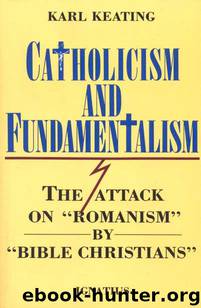Catholicism And Fundamentalism by Karl Keating

Author:Karl Keating [Keating, Karl]
Language: eng
Format: epub
Tags: Spiritual & Religion
ISBN: 9780898701777
Publisher: Ignatius Press
Published: 2010-02-05T07:00:00+00:00
Chapter 16
Purgatory
In 1769 James Boswell had this exchange with Samuel Johnson:
Boswell:“What do you think, Sir, of purgatory, as believed by the Roman Catholicks?”
Johnson:“Why, Sir, it is a very harmless doctrine. They are of the opinion that the generality of mankind are neither so obstinately wicked as to deserve everlasting punishment, nor so good as to merit being admitted into the society of blessed spirits; and therefore that God is graciously pleased to allow a middle state, where they may be purified by certain degrees of suffering. You see, Sir, there is nothing unreasonable in this.”
Boswell:“But then, Sir, their Masses for the dead?”
Johnson:“Why, Sir, if it be at once established that there are souls in purgatory, it is as proper to pray for them, as for our brethren of mankind who are yet in this life.”1
Although Johnson was no “Catholick”, he recognized that the doctrine of purgatory is not at odds with other tenets of Christianity. In fact, as he may have known, there is considerable scriptural warrant for it, even if the doctrine is not explicitly set out in the Bible.
The doctrine can be stated briefly. Purgatory is a state of purification, where the soul that has fully repented of its sins but has not fully expiated them has removed from itself the last elements of uncleanliness. In purgatory all remaining love of self is transformed into love of God. At death one’s soul goes to heaven, if it is completely fit for heaven; to purgatory, if it is not quite fit for heaven, but not worthy of condemnation; or to hell, if it is completely unfit for heaven. Purgatory is a temporary state. Everyone who enters it will get to heaven, and, after the last soul leaves purgatory for heaven, purgatory will cease to exist. There will remain only heaven and hell.
When we die, we undergo what is called the particular, or individual, judgment. We are judged instantly and receive our reward, for good or ill. We know at once what our final destiny will be. At the end of time, though, when the last people have died, there will come the general judgment to which the Bible refers. In it all our sins will be revealed. Augustine said, in The City of God, that “temporary punishments are suffered by some in this life only, by others after death, by others both now and then; but all of them before that last and strictest judgment”.2 It is between the particular and general judgments, then, that the soul expiates its sins: “I tell you, you will not get out till you have paid the very last penny” (Lk 12:59). If full expiation occurs before the general judgment, the soul is released from purgatory and goes to heaven.
Fundamentalists note that biblical references to the judgment refer only to heaven and hell. Quite true. That is because most of the references are to the general judgment, when all will be judged at once (which means, for those who died earlier and already underwent an individual judgment, a kind of rejudging, but one that is public).
Download
This site does not store any files on its server. We only index and link to content provided by other sites. Please contact the content providers to delete copyright contents if any and email us, we'll remove relevant links or contents immediately.
The Secret Power of Speaking God's Word by Joyce Meyer(3161)
Signature in the Cell: DNA and the Evidence for Intelligent Design by Stephen C. Meyer(3123)
Real Sex by Lauren F. Winner(3005)
The Holy Spirit by Billy Graham(2938)
The Gnostic Gospels by Pagels Elaine(2517)
Jesus by Paul Johnson(2349)
Devil, The by Almond Philip C(2324)
23:27 by H. L. Roberts(2245)
The Nativity by Geza Vermes(2224)
Chosen by God by R. C. Sproul(2158)
All Things New by John Eldredge(2153)
Angels of God: The Bible, the Church and the Heavenly Hosts by Mike Aquilina(1951)
The Return of the Gods by Erich von Daniken(1925)
Angels by Billy Graham(1917)
Knowing God by J.I. Packer(1848)
Jesus of Nazareth by Joseph Ratzinger(1802)
The Gnostic Gospel of St. Thomas by Tau Malachi(1781)
How To Be Born Again by Billy Graham(1775)
Evidence of the Afterlife by Jeffrey Long(1774)
